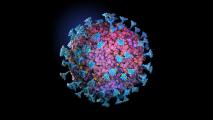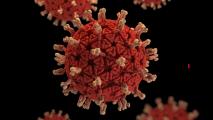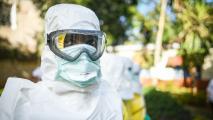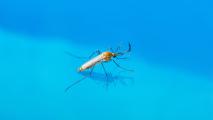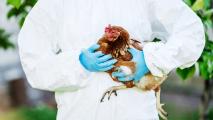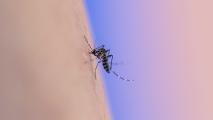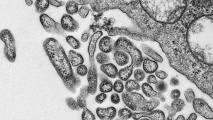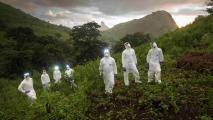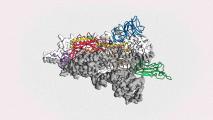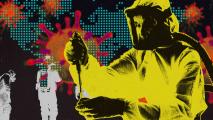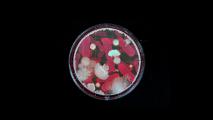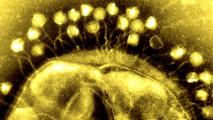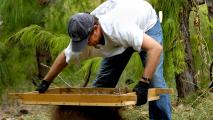Field: Virology
Oxford launches COVID reinfection study
To try and understand the immune response to SARS-CoV-2, including the threat of COVID reinfection, the University of Oxford will purposely infect volunteers.
A modified herpes virus can fight brain cancer in children
In a small clinical trial, using herpes viruses modified to only infect tumors — oncolytic virus therapy — more than doubled the life expectancy of children with aggressive brain tumors.
New approach for mRNA HIV vaccine passes first human trial
There is currently no HIV vaccine, but a new technique which produced specific immunity cells in humans may pave the way to one.
A common virus may be the key to a COVID vaccine for young children
Researchers have reverse-engineered a common children’s virus to show the spike protein, potentially leading to a new COVID vaccine for young children.
Virus hidden in human for years may have caused new ebola outbreak
A genetic report shows that a survivor of the 2014-2016 Ebola outbreak in Guinea is likely to have begun the latest episode.
One mosquito protein weakens several deadly flaviviruses
A mosquito protein that targets the viral envelope of flaviviruses, inhibiting their activity, could help doctors treat several life-threatening diseases.
Existing chemo drugs could offer a potential Ebola treatment
Capable of causing highly lethal disease, Ebola treatment is a public health priority. A new study shows chemo drugs may do just that.
Researchers have discovered how SARS-CoV-2 is mutating
SARS-CoV-2 mutations, which cause new variants of the virus, are eluding the virus’s proofreader. New research shows why.
A new bird flu is infecting people. Here’s what we know.
The H5N8 bird flu virus has reportedly infected seven poultry farm workers in Russia. Here’s what we know about the new avian flu threat.
Can CRISPR engineer immunity to avian flu in chickens?
An outbreak of avian flu in chickens can mean millions of birds dead and billions of dollars lost. This startup wants to engineer flu-resistant poultry.
Are we scratching the surface of what an old vaccination method can do?
Smallpox vaccine was administered by scratching the skin. Mice suggest this old-school method may work better against other respiratory viruses as well.
MIT's AI predicts new strains of HIV, coronavirus
As coronavirus mutations pop up around the world, researchers at MIT are using language-recognizing AI to try and predict what could be next.
New discovery could stop dengue’s “breakbone” fever
Making a dengue vaccine is difficult. It’s early, but a new antibody that targets a protein the virus makes instead of the virus itself may be a solution.
Moderna is developing an mRNA vaccine for HIV
Moderna is using the same technology behind its COVID-19 vaccine to develop an mRNA vaccine for HIV.
Phage therapy kills superbug behind many ICU infections
Combining a bacteria-killing virus and an antibiotic was able to wipe out an infection of the superbug A. baumannii in mice.
A universal flu vaccine has aced phase 1 trials
Influenza’s constant genetic shifting means flu vaccines aim at a moving target. But a universal flu vaccine just passed its phase 1 trials.
HIV can hide inside human cells for years. Can CRISPR cut it out?
Using CRISPR to stop the replication of SIV, a primate virus closely related to HIV, researchers may have taken a step to wiping the virus out in the body.
Congo just used vaccines to beat Ebola. What they learned could stop COVID, too.
Congo’s recent success delivering frigid Ebola vaccines to remote areas may provide invaluable experience for a COVID-19 vaccine cold chain.
We can now see a virus invasion in real-time
Understanding how a virus infects and replicates in a cell is crucial to stopping them. Now, researchers can see an infection in real-time.
A flu vaccine grown in tobacco plants just aced its clinical trials
Plant-based vaccines can be made cheaply and at scale. A tobacco plant-based vaccine for influenza has now been the first to complete clinical trials.
Can a new polio vaccine help finish the virus off once and for all?
Thanks to polio vaccines and public health campaigns, polio is on the run — although COVID has it fighting back. Can a new vaccine help turn the tide again?
“Virus burritos” could be the key to vaccine preservation
Vaccine preservation is crucial to world health; the WHO estimates we waste 50% of vaccines a year. Vaccine burritos may provide some help.
A deadly virus emerged in South Africa in 2008. Then it vanished.
A deadly new virus killed a South African safari agent and three others, then disappeared without a trace. What can we learn from a unique outbreak?
A new molecule may take the edge off vaccines — and make them perform better
Adjuvants create a better vaccine immune response, but they also cause inflammation. A peptide may help curb their side effects while improving protection.
Super bright X-ray lets doctors see the atoms inside viruses
The x-ray beams produced by the Extremely Brilliant Source, a new synchrotron, are so bright, they can be used to create images with atomic-level detail.
Are microbes called protists our only virus eaters?
Despite their abundance, nothing we know of eats viruses. But new research suggests microbes called protists might.
Studying pig sh*t to prevent the next pandemic
A pilot program in North Carolina offers one solution to scanning for a potential pig virus in our farm system - slurry testing.
Influenza virus may be transmitted by particles in the air
Airborne particles like dust and dander not caused by breathing — “aerosolized fomites” — may be a route of influenza virus transmission.
Bats are not the enemy
Researchers are developing options from the domestic to the deific to allow humans and bats to live together in...
A nonthermal plasma field can eliminate 99.9% of airborne viruses
Airborne viruses can be tough to stop. A team at Michigan has developed a device that may stop them cold.
Hunting zoonotic diseases before an outbreak
Stopping zoonotic diseases — and pandemics — may require studying not just viruses, but also animals, habitats, and people.
Genetic evidence debunks coronavirus conspiracy theories, scientists say
A team of researchers analyzed the COVID-19 coronavirus. Their findings debunk the conspiracy theory that the virus was lab-made.
Will these lab-made viruses prevent a pandemic?
Previously blacklisted gain-of-function mutation experiments are back, and they’re being used to fight the next major pandemic.
Can an algorithm predict the next disease outbreak?
Researchers are using this algorithm to predict which regions are likely to see a zoonotic disease outbreak, and hopefully prevent the next global pandemic.
Experts unveil “breakthrough” map of key coronavirus protein
Scientists have created the first atomic-scale 3D map of 2019-nCoV’s spike protein, the part of the coronavirus that infiltrates human cells.
The next pandemic is out there. Is the private sector ready?
Johns Hopkins' simulated, international catastrophe is helping business, government, and public health leaders improve global pandemic preparedness.
Could another measles outbreak open up Pandora’s Box?
The global resurgence of measles has sparked renewed scientific interest in this old foe. If the theory — which is contested — turns out to be true, a measles infection could be less an isolated bout of illness and more a Pandora’s box.
Uganda begins massive new Ebola vaccine study
The Ebola outbreak in the Congo is now the second deadliest on record. How can we stop the devastation? A study in Uganda could hold the key for a new vaccine.
A tumor-killing virus could treat eye cancer and save children's sight
The only treatment for retinoblastoma is surgical removal of the eye—but scientists may have found another way:...
Paige and the virus hunter
Drugs couldn’t stop her infection — so she asked Ben Chan to get her a virus, instead.
Fighting superbugs with viruses
This Yale scientist's experimental treatment is a Texas woman's last resort.
Air travel could be stopping the next plague
Our hyper-connected world might be protecting us against devastating plagues.
Meet the 380 trillion viruses inside your body
Scientists aren't exactly sure yet what the "virome" is up to, but it's probably important.
New evidence suggests viruses may trigger Alzheimer’s
For the first time in a long time, there's a new direction for potential Alzheimer's treatments.
We found the oldest human virus: It's familiar (but weird)
The discovery cracks open a 7,000-year history of human-virus warfare. And it's raising weird questions.
